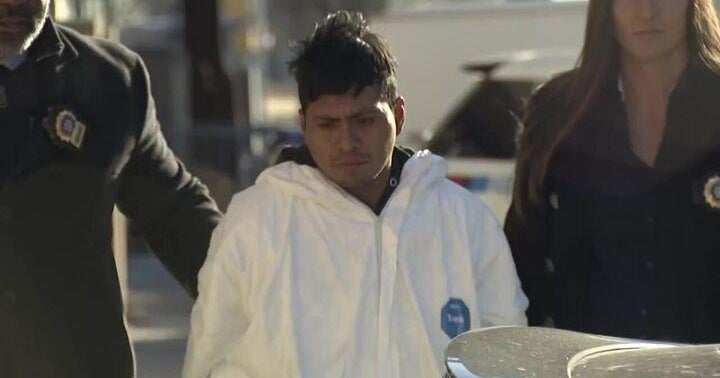Georgia Death Row Inmate Troy Davis Executed; Supporters Claim Injustice
NEW YORK (CBSNewYork/AP) -- Groups around New York City, the country and the world spent the night Wednesday rallying to save the life of Georgia death row inmate Troy Davis. But in the end, the convicted killer was executed for the 1989 murder of a Savannah police officer.
Strapped to a gurney in Georgia's death chamber, Troy Davis lifted his head and declared one last time that he did not kill police officer Mark MacPhail. Just a few feet away behind a glass window, MacPhail's son and brother watched in silence.
"I am innocent,'' Davis said moments before he was executed Wednesday night. "All I can ask ... is that you look deeper into this case so that you really can finally see the truth. I ask my family and friends to continue to fight this fight.''
Prosecutors and MacPhail's family said justice had finally been served.
"I'm kind of numb. I can't believe that it's really happened,'' MacPhail's mother, Anneliese MacPhail, said in a telephone interview from her home in Columbus, Ga. "All the feelings of relief and peace I've been waiting for all these years, they will come later. I certainly do want some peace.''
She dismissed Davis' claims of innocence.
"He's been telling himself that for 22 years. You know how it is, he can talk himself into anything.''
Davis was scheduled to die at 7 p.m., but the hour came and went as the U.S. Supreme Court apparently weighed the case. More than three hours later, the high court said it wouldn't intervene. The justices did not comment on their order rejecting Davis' request for a stay.
Hundreds of thousands of people signed petitions on Davis' behalf and he had prominent supporters. His attorneys said seven of nine key witnesses against him disputed all or parts of their testimony, but state and federal judges repeatedly ruled against him, three times on Wednesday alone.
Officer MacPhail's widow, Joan MacPhail-Harris, said it was "a time for healing for all families.''
"I will grieve for the Davis family because now they're going to understand our pain and our hurt,'' she said in a telephone interview from Jackson. "My prayers go out to them. I have been praying for them all these years. And I pray there will be some peace along the way for them.''
Davis' supporters staged vigils in the U.S. and Europe, declaring "I am Troy Davis'' on signs, T-shirts and the Internet.
In New York City, two rallies were held in Brooklyn and Harlem in support for Davis.
The New York City Council also sent Georgia's governor a letter asking the Parole Board to "reconsider its decision and grant clemency for Troy Davis."
Some tried increasingly frenzied measures, urging prison workers to stay home and even posting a judge's phone number online, hoping people would press him to put a stop to the lethal injection. President Barack Obama deflected calls for him to get involved.
"They say death row; we say hell no!'' protesters shouted outside the Jackson prison before Davis was executed. In Washington, a crowd outside the Supreme Court yelled the same chant.
As many as 700 demonstrators gathered outside the prison as a few dozen riot police stood watch, but the crowd thinned as the night wore on and the outcome became clear.
Davis' execution had been halted three times since 2007. The U.S. Supreme Court even gave Davis an unusual opportunity to prove his innocence in a lower court last year.
"Troy Davis has impacted the world,'' his sister Martina Correia said before the execution. "They say, 'I am Troy Davis,' in languages he can't speak.''
Members of Davis' family who witnessed the execution left without talking to reporters.
Davis' supporters included former President Jimmy Carter, Pope Benedict XVI, a former FBI director, the NAACP, several conservative figures and many celebrities, including hip-hop star Sean "P. Diddy'' Combs.
Davis was convicted in 1991 of killing MacPhail, who was working as a security guard at the time. MacPhail rushed to the aid of a homeless man who prosecutors said Davis was bashing with a handgun after asking him for a beer. Prosecutors said Davis had a smirk on his face as he shot the officer to death in a Burger King parking lot in Savannah.
No gun was ever found, but prosecutors say shell casings were linked to an earlier shooting for which Davis was convicted.
Witnesses placed Davis at the crime scene and identified him as the shooter, but several of them have recanted their accounts and some jurors have said they've changed their minds about his guilt. Others have claimed a man who was with Davis that night has told people he actually shot the officer.
After his execution, the American Civil Liberties Union, which was one of the groups holding the rally for Davis in New York City on Wednesday, issued a statement condemning the State of Georgia.
"The execution of an innocent man crystallizes in the most sickening way the vast systemic injustices that plague our death penalty system. No innocent person should ever be put to death, and it is unconscionable and unconstitutional to carry out an execution where, as in the case of Troy Davis, significant doubts exist," Denny LeBoeuf, the American Civil Liberties Union's Capital Punishment Project director said in the statement. "Troy's case makes clear that the death penalty system in the United States is broken beyond repair. It is arbitrary, discriminatory and comes at an enormous cost to taxpayers, and it must be ended."
Please share your thoughts below...
(TM and Copyright 2011 CBS Radio Inc. and its relevant subsidiaries. CBS RADIO and EYE Logo TM and Copyright 2011 CBS Broadcasting Inc. Used under license. All Rights Reserved. This material may not be published, broadcast, rewritten, or redistributed. The Associated Press contributed to this report.)



